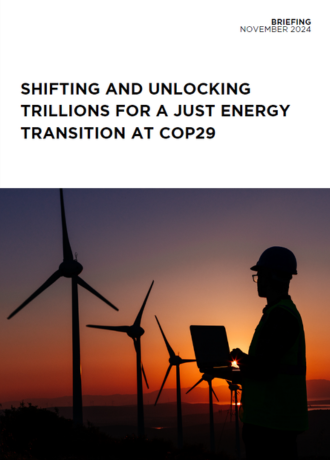
Shifting And Unlocking Trillions For A Just Energy Transition At COP29
Last year at COP28, governments committed to transition away from fossil fuels. The next key step to make good on this landmark energy agreement is rich countries agreeing to a new climate finance goal of at least $1 trillion annually to make this possible. This will allow countries to deliver national climate plans (NDCs) due in 2025 that phase out fossil fuels.
Shifting And Unlocking Trillions For A Just Energy Transition At COP29
Rich countries can mobilize well over $5 trillion a year for climate action at home and abroad by ending fossil fuel handouts, making big polluters pay, and changing unfair global financial rules. This briefing is published as global leaders meet at COP29, where rich countries must agree on a new global climate finance target (NCQG) of at least $1 trillion annually in grants and grant-equivalent finance – a key to unlocking the quality and quantity of finance that countries need in order to deliver last year’s commitment to transition away from fossil fuels. Only strong finance targets will unlock strong national climate plans (NDCs) due in 2025 that phase out fossil fuels – but rich countries are pushing for a private-sector-first approach that simply won’t deliver the quality and quantity of finance we need.
Key points:
- Lack of funding and fiscal space is an urgent obstacle to fulfilling the landmark COP28 decision to transition away from fossil fuels and triple renewable energy and double energy efficiency by 2030 in much of the Global South.
- The success of COP29 depends on countries agreeing a new climate finance target (NCQG) of at least $1 trillion per year in grants and grant-equivalent finance for mitigation, adaptation, and loss and damage.
- A private finance focused ‘investment’ or ‘mobilization’ target is not a viable replacement for this. The last decade plus of international climate finance initiatives shows this approach cannot deliver the scale, distribution, or quality of finance needed for just energy transition.
- Rather than each dollar of concessional (subsidized) public finance delivering $5 to $7 dollars of private finance for just energy transition as is usually claimed, real world data shows on average it has brought in just 85 cents.
- Global North countries have the means to mobilize well over $5 trillion a year for climate action at home and for the NCQG, including by ending fossil fuel handouts, making big polluters pay, and changing unfair global financial rules.
- Countries must not get distracted by energy finance proposals or oil money funds that do little more than greenwash. Instead they should focus on delivering a strong and accountable NCQG and making polluters pay through well-designed fossil fuel levies. This is key to re-establish trust in climate diplomacy and unlock accelerated global climate action.
*This briefing is an updated resource originally published in September 2024, including new data. Find September’s briefing published during Climate Week NYC here.
